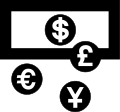List of circulating currencies
There are 180 currencies recognized as legal tender in United Nations (UN) member states, UN General Assembly non-member observer states, partially recognized or unrecognized states, and their dependencies.[1] However, excluding the pegged (fixed exchange rate) currencies, there are only 130 currencies that are independent or pegged to a currency basket. Dependencies and unrecognized states are listed here only if another currency is used on their territory that is different from the one of the state that administers them or has jurisdiction over them.
Criteria for inclusion
[edit]A currency is a kind of money and medium of exchange. Currency includes paper, cotton, or polymer banknotes and metal coins. States generally have a monopoly on the issuing of currency, although some states share currencies with other states. For the purposes of this list, only currencies that are legal tender, including those used in actual commerce or issued for commemorative purposes, are considered "circulating currencies". This includes fractional units that have no physical form but are recognized by the issuing state, such as the United States mill,[A] the Egyptian millieme,[B] and the Japanese rin.[C] Currencies used by non-state entities, like the Sovereign Military Order of Malta, scrips used by private entities, and other private, virtual, and alternative currencies are not included on this list.
-
U.S. dollar, the official currency of the United States, the world's dominant reserve currency and the most traded currency globally.
-
Euro, the currency used by the most countries and territories, the second-largest reserve currency and the second-most traded currency.
-
Some currencies, such as the Abkhazian apsar, are not used in day-to-day commerce, but are legal tender in their issuing jurisdiction.
List of circulating currencies by state or territory
[edit]| Colour key and notes |
|---|
Indicates that a given currency is pegged to another currency (details)
|
| Italics indicates a state or territory with a low level of international recognition |
Currencies by number of countries/territories
[edit]See also
[edit]- List of currencies
- Reserve currency § Global currency reserves - currencies in most common use internationally
- List of historical currencies
- Money
- Private currency
- Exchange rate
- List of countries by exchange rate regime
Notes
[edit]| Part of a series on |
| Numismatics the study of currency |
|---|
 |
- ^ a b One cent equals ten mills.
- ^ a b One piastre equals ten milliemes.
- ^ a b One sen equals ten rin.
- ^ Many of these symbols can be found in Unicode block 20A0–20, "Currency Symbols".
- ^ a b c d This currency is not used in day-to-day commerce, but is legal tender. It is minted or printed as commemorative banknotes, coinage, or both.
- ^ a b c d Although part of the Netherlands, the islands of Bonaire, Sint Eustatius, and Saba do not use the euro; they use the United States dollar. They are listed separately.
- ^ One jiao equals ten fen.
- ^ a b One piastre equals ten fulūs and one dirham equals 10 piastres.
- ^ Four currencies circulate in the partially recognized state of the Sahrawi Arab Democratic Republic, which claims the territory of Western Sahara. The Moroccan dirham is used in the Moroccan-administered part of the territory and the Sahrawi peseta is the commemorative currency of the Sahrawi Republic. Additionally, some de facto currencies circulate in the territory: the Algerian dinar is used in Sahrawi refugee camps in Tindouf and the Mauritanian ouguiya is used in Lagouira, which is under Mauritanian administration.
- ^ Rappen in German; centime in French; centesimo in Italian; rap in Romansh.
- ^ One hundred Tongan paʻanga equal one hau.
- ^ One hào equals ten xu.
References
[edit]- ^ "UN Operational Rates of Exchange - Rates". Treasury - UN Operational Rates of Exchange. Retrieved 2024-09-02.
- ^ a b "Field Listing: Exchange Rates". The World Factbook. Central Intelligence Agency. Archived from the original on 2015-02-15. Retrieved 2013-12-06.
- ^ a b "Current currency & funds code list". Swiss Association for Standardization. Archived from the original on 2019-06-16. Retrieved 2013-12-06. As of 2016-09-13, this citation said "accessdate=2013-12-06", but the document itself said "Published July 1, 2016".
- ^ "World Bank Group Publications Editorial Style Guide 2020" (PDF). World Bank Group. 2020. Archived (PDF) from the original on 2023-04-12. Retrieved 2023-04-12.
- ^ El Salvador, primer país del mundo en reconocer al Bitcoin como moneda de curso legal Archived 2021-12-22 at the Wayback Machine, June 9th 2021, official website of the Legislative Assembly of El Salvador



